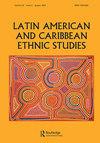‘Tornar-se negra, tornar-se branca’ e os riscos do ‘antirracismo de fachada’ no Brasil contemporâneo
IF 1
Q4 ETHNIC STUDIES
引用次数: 1
Abstract
ABSTRACT The article is the result of an encounter between a white Professor and a black student during a course about racism and whiteness, in a graduate program of sociology at a Brazilian university. Black students now reach about 50 percent of Brazilian public universities’ student population, thanks to affirmative action policies initiated in the 21st century, challenging white professors and researchers to deconstruct traditional curricula, writing, and teaching practices. That experience in the classroom led the Professor and her former student to construct a collaborative autoethnography, critically elaborating memories about their processes of ‘becoming’ black and white. Both opposed and intertwined, their narratives make it possible to unveil broader dynamics of racialization in course in Brazil. Reflecting on their experiences, the authors outline the notion of ‘the anti-racism façade,’ which they propose as a critical and political tool for the analysis of contemporary movements against racism. They also propose autoethnography as an ideal method to take into consideration researchers’ personal implication in studies on whiteness. With auto-ethnography, anti-racist intellectuals can engage in a more effective and visceral way in the face of the persistent ideology of mestizaje in Brazil and Latin America.“变成黑人,变成白人”和当代巴西“表面上的反种族主义”的风险
这篇文章是在巴西一所大学的社会学研究生课程中,一位白人教授和一位黑人学生在关于种族主义和白人的课程上相遇的结果。由于21世纪开始实施的平权行动政策,黑人学生现在占巴西公立大学学生总数的50%左右,这对白人教授和研究人员解构传统课程、写作和教学实践提出了挑战。在课堂上的经历让教授和她以前的学生构建了一个合作的自我民族志,批判性地阐述了他们“成为”黑人和白人的过程的记忆。他们的叙述既对立又交织在一起,使人们有可能揭示巴西正在进行的更广泛的种族化动态。反思他们的经验,作者概述了“反种族主义farade”的概念,他们提出将其作为分析当代反种族主义运动的关键和政治工具。他们还提出,自我民族志是一种理想的方法,可以考虑研究人员在白人研究中的个人含义。有了自动人种志,反种族主义知识分子可以更有效、更发自内心地面对巴西和拉丁美洲持续存在的梅斯蒂萨伊人意识形态。
本文章由计算机程序翻译,如有差异,请以英文原文为准。
求助全文
约1分钟内获得全文
求助全文
来源期刊

Latin American and Caribbean Ethnic Studies
Social Sciences-Cultural Studies
CiteScore
1.30
自引率
16.70%
发文量
22
 求助内容:
求助内容: 应助结果提醒方式:
应助结果提醒方式:


